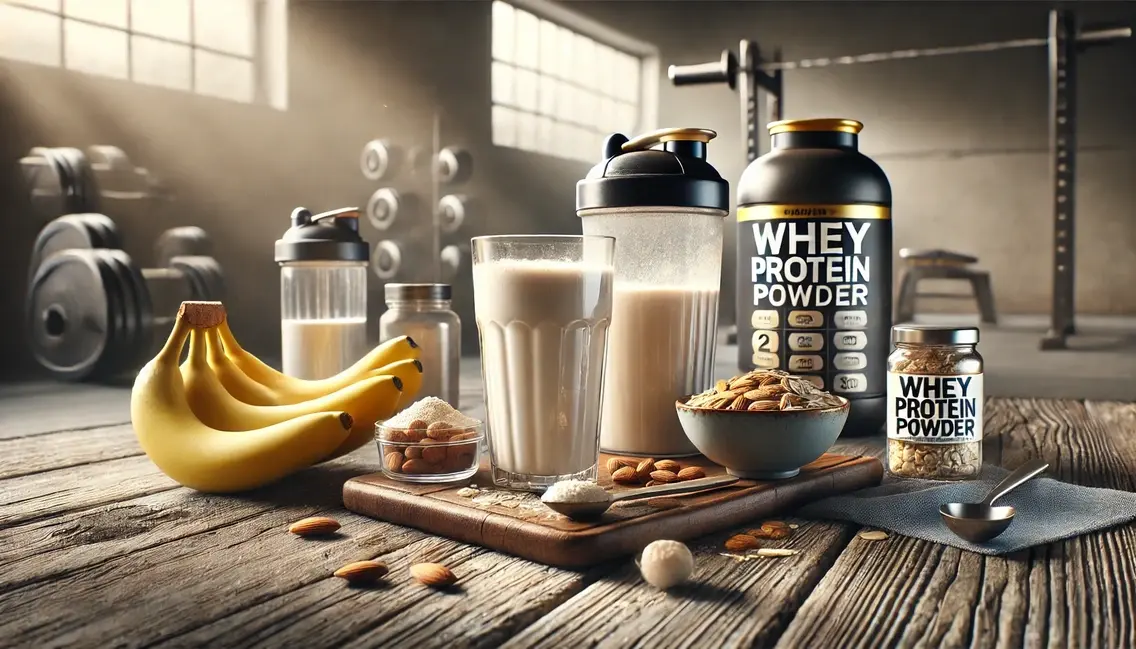The Secret Muscle-Boosting Power of Whey Protein: Are You Missing Out?
Imagine if there was a simple, fast-acting supplement that could catapult your muscle growth, enhance recovery, and support your weight management goals—all without the hassle of rigid meal plans or complex regimens. Enter whey protein, a powerful ally derived straight from the cheese-making process. Packed with essential amino acids, it’s rapidly absorbed, making it the ultimate secret to taking your fitness to the next level.
Yet, despite its benefits, there’s no shortage of myths surrounding whey protein. Do you really know how much your body needs, or whether it’s safe to consume daily? What about the best time to take it for maximum muscle gains? Contrary to popular belief, consuming whey protein post-workout within a 30-minute to two-hour window dramatically enhances muscle protein synthesis, a fact supported by experts from the American College of Sports Medicine.
These insights are just the tip of the iceberg. What about those whispered concerns over digestive discomfort or kidney strain? Fear not—there’s a wealth of scientific research debunking these misconceptions, emphasizing its safety for most individuals. Ready to dive into the profound benefits and truths? You might just rethink your routine forever.
Health Benefits of Whey Protein
Whey protein stands out as a highly effective dietary supplement, originating from milk during the cheese-making process. Its rapid absorption and comprehensive amino acid profile make whey protein an excellent choice for supporting various health and fitness goals.
Key Health Benefits
- Promotes Muscle Growth
Enriched with essential amino acids, whey protein is especially abundant in leucine, which powerfully stimulates protein synthesis. This makes it particularly effective for enhancing muscle growth and strength, especially when consumed after exercise.
- Aids in Weight Management
Whey protein can support weight management by increasing feelings of fullness, which helps reduce overall calorie intake. It aids in losing fat while maintaining lean muscle, promoting a balanced and healthy physique.
- Supports Recovery After Exercise
With its high biological value, whey protein ensures that amino acids are quickly delivered to muscles post-workout, which is crucial for the repair and growth of muscle tissues. This process can reduce muscle soreness and improve recovery time.
- Enhances Protein Synthesis
Whey protein's rich amino acid content is key in enhancing protein synthesis, vital for muscle repair and growth. Consuming whey protein following resistance or endurance training further amplifies this process.
Incorporating Whey Protein for Optimal Health
Whey protein, celebrated for its muscle-enhancing and recovery-boosting capabilities, is a versatile supplement beneficial to both athletes and the general public. Integrating this supplement into your diet with strategic timing can help you achieve your health objectives. One popular choice among Canadians is the LEANFIT Sport Grass-Fed 100% WHEY ISOLATE, known for delivering 26g of pure protein per serving, zero sugar, and being keto-friendly. Elevate your protein intake with LEANFIT Sport Grass-Fed 100% WHEY ISOLATE to support your fitness journey effectively.
Dietary sources of Whey Protein
Whey protein, known for its impressive amino acid profile and rapid absorption, is highly regarded for muscle growth and recovery. While many Canadians strive to meet their nutritional needs naturally, incorporating enough whey protein through diet alone poses unique challenges.
Natural Sources of Whey Protein
- Milk
As a by-product of cheese production, whey protein originates directly from milk. This high-quality protein entails all essential amino acids crucial for muscle repair and growth. However, one might need to consume substantial quantities of skim or whole milk regularly to meet daily protein needs, which can be impractical for some individuals.
- Yogurt
Particularly rich in protein, Greek yogurt is a valuable source of whey and offers probiotics to support digestive health. However, eating yogurt alone may not provide adequate amounts of protein daily unless consumed in large portions that some may find excessive.
- Requesón (Ricotta) Cheese
With a higher whey content compared to other cheeses, ricotta provides both casein and whey proteins essential for muscle maintenance. Yet, like other dairy products, one would need to include significant amounts frequently, which might not suit every dietary or health preference.
Addressing Challenges in Obtaining Sufficient Whey Protein
Meeting the recommended daily intake of protein exclusively through natural food sources can be challenging due to practical dietary limitations. Many individuals find it tough to consume large enough quantities of milk, yogurt, or cheese to meet their protein goals without excessive calorie intake or fatigue of the palate.
For those encountering such limitations, considering supplementation can be beneficial. Elevate your protein intake with LEANFIT Sport Grass-Fed 100% WHEY ISOLATE, delivering 26g of pure protein per serving with zero sugar, making it an accessible and keto-friendly solution for reaching protein targets effectively and conveniently.
Daily Intake for Whey Protein
Whey protein is a superior protein source derived from milk, celebrated for its comprehensive amino acid profile and efficiency in boosting muscle growth, recovery, and weight management. This makes it an excellent choice for those involved in exercise and fitness, aiming to enhance protein synthesis.
Recommended Daily Intake
Understanding your daily protein needs is essential for optimizing fitness outcomes. Based on scientific guidelines, consider the following:
- General Fitness Enthusiasts: Aim for 0.8-1.0 grams of protein per kilogram of body weight per day. This range supports overall health and baseline muscle maintenance.
- Endurance Athletes: A higher intake of 1.2-1.4 grams per kilogram is beneficial, as it aids in reducing muscle breakdown during prolonged activities.
- Strength/Power Athletes: To support intense muscle demands, 1.6-2.2 grams per kilogram is ideal, promoting greater muscle repair and growth.
Meeting Your Daily Whey Protein Needs
To harness the full potential of whey protein, incorporate it into a well-balanced diet. Consistent intake is crucial for maintaining muscle health and should be prioritized, especially post-exercise, to maximize muscle protein synthesis. If whey protein suits your diet, consider incorporating it through options like LEANFIT Sport Grass-Fed 100% WHEY ISOLATE, which provides 26g of pure protein, zero sugar, and is keto-friendly, offering a clean, efficient way to meet your dietary needs.
For those with lactose intolerance or specific dietary restrictions, alternative protein sources or professional dietary advice may be necessary to ensure adequate nutrition. Coming up, we'll discuss how inadequate protein levels can adversely affect your health and identify signs of deficiency.
Deficiency of Whey Protein
While often overlooked, an insufficient intake of whey protein can have serious implications, especially for those dedicated to fitness or athletic pursuits. Unlike vitamin or mineral deficiencies, the lack of high-quality protein like whey primarily affects muscle health and recovery—critical for anyone looking to optimize their physical performance.
Deficiency Symptoms and Consequences
- Muscle Loss or Poor Muscle Development
Protein is the backbone of muscle growth and repair. Without an adequate supply of high-quality protein, such as whey, muscle wastage becomes a genuine threat. This risk is significantly heightened in individuals committed to strength and resistance training regimes.
- Decreased Recovery Rate
Whey protein significantly contributes to muscle recovery. Falling short on daily protein needs can delay recovery times, diminishing your performance and potentially increasing the risk of training-related injuries.
- Impaired Protein Synthesis
Leucine-rich whey protein drives efficient protein synthesis. A deficiency in this area can derail muscle repair and growth, keeping you from reaching your full potential.
Preventing Whey Protein Deficiency
To guard against the risks of inadequate protein intake, it's vital to include quality proteins in your diet, particularly if you're physically active. Strive for 20-30 grams of whey protein per serving tailored to your personal requirements. Elevate your protein intake with LEANFIT Sport Grass-Fed 100% WHEY ISOLATE – 26g of pure protein per serving, zero sugar, and keto-friendly! Capitalizing on such reliable sources ensures effective muscle repair and supports peak athletic performance.
Intrigued by common misconceptions and curious about practical concerns? Our upcoming FAQ explores whey protein, addressing safe consumption practices and maximizing benefits.
Conclusion
Whey protein is not just a supplement; it's a vital cornerstone for anyone serious about enhancing their health and fitness levels. As you've discovered, the benefits of incorporating this powerhouse into your routine are substantial, ranging from bolstering muscle growth to effectively supporting weight management and recovery. But beyond the science and the metrics lies a crucial question: are you truly maximizing its potential in your fitness journey?
Consider this: every scoop of whey protein is a step closer to realizing your fitness ambitions. It's not just about post-workout recovery; it's about setting a foundation for success in every aspect of your health regimen. Are you prepared to integrate this efficiently absorbed, nutrient-rich supplement into your lifestyle?
While we've dispelled common myths and illuminated its benefits, it's time for you to take action. Next time you're at the store or browsing online, think about how incorporating a high-quality whey protein like LEANFIT Sport Grass-Fed 100% WHEY ISOLATE could elevate your training outcomes. And remember, your journey is unique—don't hesitate to tailor your approach according to your body's needs.
So, how will you transform this newfound knowledge into tangible results? Will your post-workout shake become a staple, or perhaps you’ll explore new recipes to integrate whey protein creatively into your meals? Share your thoughts with us and the GymBro.ca community—after all, transformation is most powerful when shared. Take the next step today, and let the protein-powered revolution commence!

